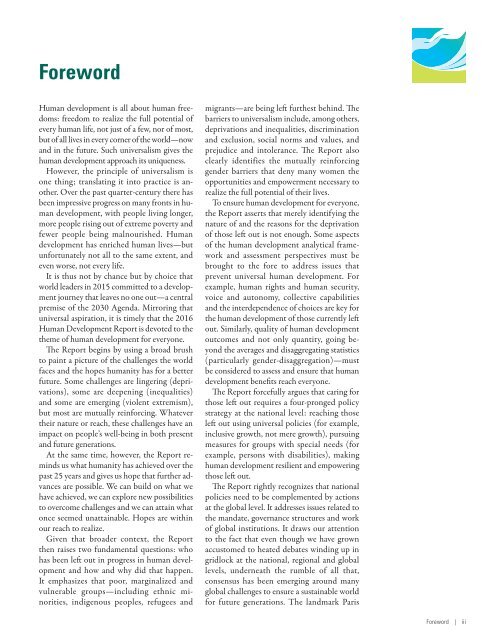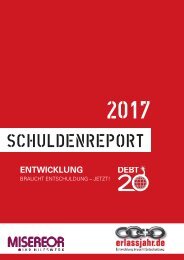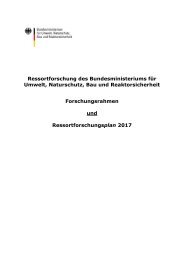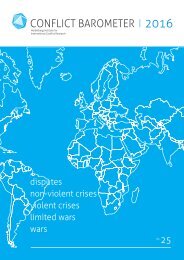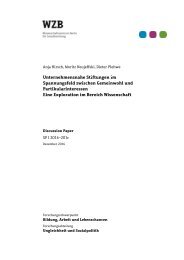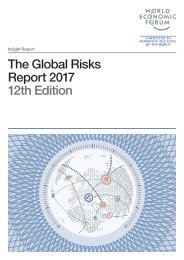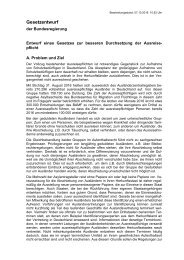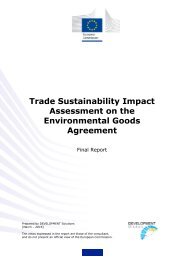Human Development Report 2016
6Tyccfrzw
6Tyccfrzw
Create successful ePaper yourself
Turn your PDF publications into a flip-book with our unique Google optimized e-Paper software.
<strong>Human</strong> <strong>Development</strong><br />
<strong>Report</strong> <strong>2016</strong><br />
<strong>Human</strong> <strong>Development</strong> for Everyone<br />
Foreword<br />
<strong>Human</strong> development is all about human freedoms:<br />
freedom to realize the full potential of<br />
every human life, not just of a few, nor of most,<br />
but of all lives in every corner of the world—now<br />
and in the future. Such universalism gives the<br />
human development approach its uniqueness.<br />
However, the principle of universalism is<br />
one thing; translating it into practice is another.<br />
Over the past quarter-century there has<br />
been impressive progress on many fronts in human<br />
development, with people living longer,<br />
more people rising out of extreme poverty and<br />
fewer people being malnourished. <strong>Human</strong><br />
development has enriched human lives—but<br />
unfortunately not all to the same extent, and<br />
even worse, not every life.<br />
It is thus not by chance but by choice that<br />
world leaders in 2015 committed to a development<br />
journey that leaves no one out—a central<br />
premise of the 2030 Agenda. Mirroring that<br />
universal aspiration, it is timely that the <strong>2016</strong><br />
<strong>Human</strong> <strong>Development</strong> <strong>Report</strong> is devoted to the<br />
theme of human development for everyone.<br />
The <strong>Report</strong> begins by using a broad brush<br />
to paint a picture of the challenges the world<br />
faces and the hopes humanity has for a better<br />
future. Some challenges are lingering (deprivations),<br />
some are deepening (inequalities)<br />
and some are emerging (violent extremism),<br />
but most are mutually reinforcing. Whatever<br />
their nature or reach, these challenges have an<br />
impact on people’s well-being in both present<br />
and future generations.<br />
At the same time, however, the <strong>Report</strong> reminds<br />
us what humanity has achieved over the<br />
past 25 years and gives us hope that further advances<br />
are possible. We can build on what we<br />
have achieved, we can explore new possibilities<br />
to overcome challenges and we can attain what<br />
once seemed unattainable. Hopes are within<br />
our reach to realize.<br />
Given that broader context, the <strong>Report</strong><br />
then raises two fundamental questions: who<br />
has been left out in progress in human development<br />
and how and why did that happen.<br />
It emphasizes that poor, marginalized and<br />
vulnerable groups—including ethnic minorities,<br />
indigenous peoples, refugees and<br />
migrants—are being left furthest behind. The<br />
barriers to universalism include, among others,<br />
deprivations and inequalities, discrimination<br />
and exclusion, social norms and values, and<br />
prejudice and intolerance. The <strong>Report</strong> also<br />
clearly identifies the mutually reinforcing<br />
gender barriers that deny many women the<br />
opportunities and empowerment necessary to<br />
realize the full potential of their lives.<br />
To ensure human development for everyone,<br />
the <strong>Report</strong> asserts that merely identifying the<br />
nature of and the reasons for the deprivation<br />
of those left out is not enough. Some aspects<br />
of the human development analytical framework<br />
and assessment perspectives must be<br />
brought to the fore to address issues that<br />
prevent universal human development. For<br />
example, human rights and human security,<br />
voice and autonomy, collective capabilities<br />
and the interdependence of choices are key for<br />
the human development of those currently left<br />
out. Similarly, quality of human development<br />
outcomes and not only quantity, going beyond<br />
the averages and disaggregating statistics<br />
(particularly gender-disaggregation)—must<br />
be considered to assess and ensure that human<br />
development benefits reach everyone.<br />
The <strong>Report</strong> forcefully argues that caring for<br />
those left out requires a four-pronged policy<br />
strategy at the national level: reaching those<br />
left out using universal policies (for example,<br />
inclusive growth, not mere growth), pursuing<br />
measures for groups with special needs (for<br />
example, persons with disabilities), making<br />
human development resilient and empowering<br />
those left out.<br />
The <strong>Report</strong> rightly recognizes that national<br />
policies need to be complemented by actions<br />
at the global level. It addresses issues related to<br />
the mandate, governance structures and work<br />
of global institutions. It draws our attention<br />
to the fact that even though we have grown<br />
accustomed to heated debates winding up in<br />
gridlock at the national, regional and global<br />
levels, underneath the rumble of all that,<br />
consensus has been emerging around many<br />
global challenges to ensure a sustainable world<br />
for future generations. The landmark Paris<br />
Foreword | iii


